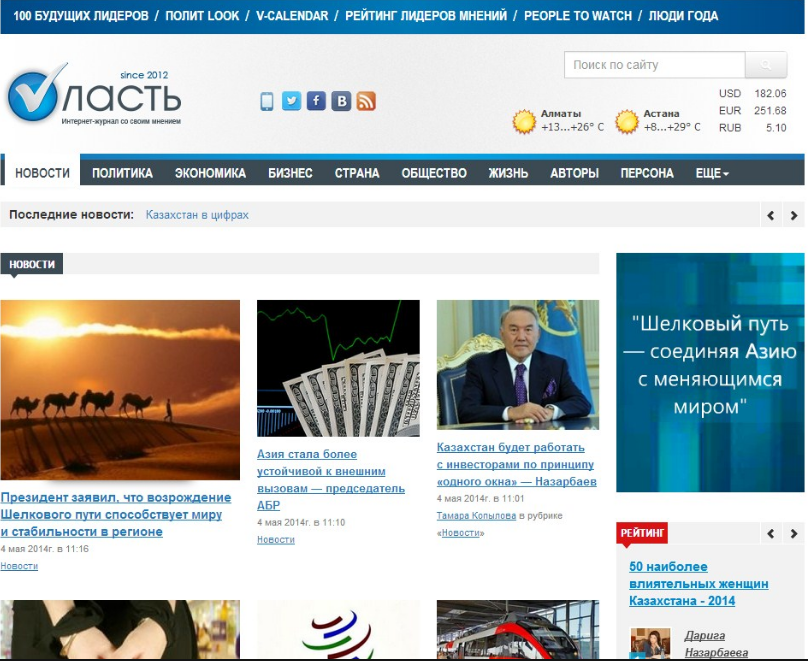 A much-respected current affairs publication in Kazakhstan has announced it is set to close because of financial difficulties, further impoverishing a media scene dominated by outlets funded by the government.
A much-respected current affairs publication in Kazakhstan has announced it is set to close because of financial difficulties, further impoverishing a media scene dominated by outlets funded by the government.
Vyacheslav Abramov, chief editor of Vlast, said in a Facebook post on July 1 that the last issue of his magazine would be published next week.
“Many of you know that we had financial backers, but in the past two years we worked to buy ourselves out. Unfortunately, that period was accompanied by devaluation (of the tenge) and an economic crisis, which are hard things for an independent media outlet to survive,” Abramov said.
Vlast (Vласть in its Russian spelling — a combination of Latin and Cyrillic letters) employed around 20 people, mostly in of the country’s business capital, Almaty.
Media outlets in Kazakhstan, from broadcasters to print and online, largely occupy a range between outright servility to the state and meek compliance. Government outlets drily report official news with a minimum of incisive analysis, while even the more feisty outlets shy away from outright criticism of corruption or incompetence among high-level officials. Actively critical voices have pretty much all been silenced, although when they were able to operate more freely, they all too often resorted to crude, unsourced rumor-mongering, thereby undermining the credibility and value of their output.
Vlast, which could best be liked to a publication like Forbes or The Economist, tacked a course between those two polar opposites — a rare strategy in Kazakhstan.
Amirzhan Kosanov, a political commentator and opposition activist, mourned the passing of the publication.
“Today I learned about the closure of a magazine that was smart, high-quality, interesting, relevant and that, most importantly, took an equal distance from all public institutions and personalities,” Kosanov wrote on his Facebook account.
As Abramov suggested, the broader economic landscape in Kazakhstan has made turning a profit for any enterprise difficult, but government policy makes prospects for any media company even more bleak.
The market is hugely distorted by a system of state subsidies for outlets that typically run content that is neutral or positive about government policy.
Diana Okremova, head of the Legal Media Center foundation, has said that the subsidies, which are known by the shorthand term “state order,” in 2015 reached a whopping 45 billion tenge ($132 million at the current exchange rate). According to a recent analysis by the Almaty-based MediaNet International Center for Journalism, about 70 percent of media organizations in Kazakhstan somehow receive funds via the state order.
State media outlets get expenses covered through the system, while private sector peers are required to compete for allocations. It should go without saying that this is money that the recipient outlets can spend without having to worry about the demand of appealing to readers and advertisers.
The result of this policy is to flatten the quality of coverage and even reporting by state media about the government is inclined to be more tedious than fulsome.
And in one high-profile instance, the state order mechanism has led to alleged corruption. In February, authorities arrested prominent journalist Seitkazy Matayev on charges of fraud and embezzlement. One line of inquiry involved the alleged misappropriation of hundreds of thousands of dollars through the state order system.
The government is on some level — albeit a rather confused and self-interested one — aware that Kazakhstan lacks efficient mechanisms to convey its message to the broader population.
President Nursultan Nazarbayev reacted to the recent surge of protests against proposed and contentious land reforms with a twin approach — mass detentions for participants and organizers, followed by the creation of an Information Ministry, whose aim will be to facilitate communication with the people. In a country with a free and robust media, that role would be exercised by the press, of course.
By a cruel coincidence, Nazarbayev met on July 1 with Information Minister Dauren Abayev to hear about progress at the new department. The president’s remarks betrayed an evident intent to focus more on propaganda than creating the conditions for a flourishing media environment.
“All the world's media, including that in Russia, works for the benefit of their countries by raising the patriotic feelings of their citizens, maintaining domestic political stability, creating a barrier against external information attacks and providing information and responding to questions in a timely fashion,” Nazarbayev said.
Curiously, Nazarbayev also queried the level of government scrutiny over how the state order is used, although he seemed more concerned about it from an accounting perspective than whether it actually served any useful purpose.
Nazarbayev’s remarks evinced a deeply ingrained, Soviet approach to media that is clearly ill-suited to cater to an evolving society that is abandoning traditional forms of information distribution in favor of social media and messaging platforms that effortlessly circumvent state edicts.
EurasiaNet.Org, 1.07.2016




